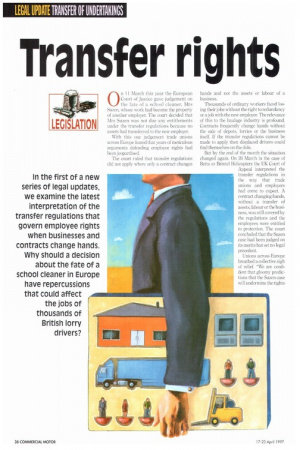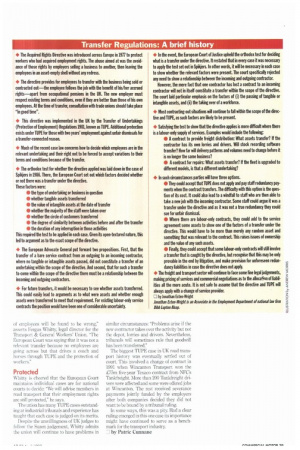Transfer rights
Page 50

Page 51

If you've noticed an error in this article please click here to report it so we can fix it.
0 n 11 March this year the European Court of Justice gave judgement on the fate of a school cleaner, Mrs Suzen, whose work had become the property of another employer. The court decided that Mrs Suzen was not due any entitlements under the transfer regulations because no assets had transferred to the new employer.
With this one judgement trade unions across Europe feared that years of meticulous arguments defending employee rights had been jeopardised.
The court ruled that transfer regulations did not apply where only a contract changes hands and not the assets or labour of a business.
Thousands of ordinary workers faced losing their jobs without the right to redundancy or a job with the new employer. The relevance of this to the haulage industry is profound. Contracts frequently change hands without the sale of depots. lorries or the business itself. If the transfer regulations cannot be made to apply then displaced drivers could find themselves on the dole.
But by the end of the month the situation changed again. On 26 March in the case of Betts vs Brintel Helicopters the UK Court of Appeal interpreted the transfer regulations in the way that trade unions and employers had come to expect. A contract changing hands, without a transfer of assets, labour or the business, was still covered by the regulations and the employees were entitled to protection. The court concluded that the Suzen case had been judged on its merits but set no legal precedent.
Unions across Europe breathed a collective sigh of relief. "We are confident that gloomy predictions that the Suzen case will undermine the rights
of employees will be found to be wrong," asserts Fergus Whitty, legal director for the Transport & General Workers' Union. The European Court was saying that it was not a relevant transfer because no employees are going across but that drives a coach and horses through TUPE and the protection of workers."
Protected
W hi tty is cheered that the European Court maintains individual cases are for national courts to decide: "We will advise members in road transport that their employment rights are still protected," he says.
The union has many TUPE cases outstanding at industrial tribunals and experience has taught that each case is judged on its merits.
Despite the unwillingness of UK judges to follow the Suzen judgement, Whitty admits the union will continue to have problems in
similar circumstances: "Problems arise if the new contractor takes over the activity but not the depot, lorries and drivers. Nevertheless, tribunals will sometimes rule that goodwill has been transferred."
The biggest TUPE case in UK road transport history was eventually settled out of court. This involved a change of contract in 1991 when Wincanton Transport won the 05m five-year Texaco contract from NFC's Tankfreight. More than 200 Tankfreight drivers were affected and some were offered jobs at Wincanton. The rest received severance payments jointly funded by the employers after both companies decided they did not want to be bound by a tribunal ruling.
In some ways, this was a pity. Had a clear ruling emerged in this one case its importance might have continued to serve as a benchmark for the transport industry.
by Patric Cunnane




















































































































